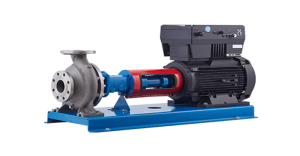A centrifugal pump is defined as a hydraulic machine that changes mechanical energy into hydraulic energy by the use of centrifugal force acting on the fluid. This is a machine that uses rotation to enforce velocity on a liquid, the velocity will then be converted into a flow. Every centrifugal pump is made up of mechanical components that make the operation of the pump possible. Centrifugal pumps are commonly used in various industries for fluid transportation.
They work by converting rotational energy into kinetic energy, propelling the fluid through the pump. These pumps are efficient, reliable, and suitable for a wide range of applications such as water supply, wastewater treatment, and chemical processing.
Operating Principle:
Centrifugal pumps work to produce flow or raise a fluid from a lower level to a higher level. The working of these pumps is based on a straightforward mechanism. A centrifugal pump turns rotational energy coming from a motor into energy in a moving fluid.
The two main components responsible for this task are the impeller, and the casing, both of which belong to the portion of the pump called the wet end. The impeller is the rotating part, and the casing is the airtight path that surrounds the impeller.
Smooth Flow – Centrifugal flow is laminar and non-pulsating allowing them to be used with flowmeters easily.
Low Maintenance & Easy to maintain – Due to their simple uncomplicated design, they are often maintained without special tools or equipment.
Efficient – As the internal elements are free to rotate, they are very efficient when handling low-viscosity fluids
Versatile – They can be designed to handle a multitude of liquids and solids by changing the materials of certain parts, or impeller design.
Low Cost – Due to their simplicity of design and wide availability, they are one of the lowest initial costs of pump. If specified correctly they can also provide the lowest lifetime cost for an application.
Low Infrastructure costs – As Centrifugal pumps can be run against a closed valve for short periods without damage, additional accessories such as pressure relief valves and other devices are not required.
Benefits of Centrifugal Pumps
The benefits of centrifugal pumps include:
- There is reduced friction in the pump.
- Magnetic coupling breaking the pump will not overload and will also not get damaged.
- Corrosion Resistance – the pumps allow processors and manufacturers to transfer different types of fluids, even those that can quickly corrode the other pumps. The pumps even when used extremely well can offer a long service life. The pumps are able to withstand corrosive materials.
- Energy Efficiency – Centrifugal chemical pumps rank high in energy efficiency in comparison to all the other pumping technologies. Their efficiency reduces costs both over the life span and in the short term of each unit.
A centrifugal pump is a machine that changes kinetic energy into the fluid’s pressure head. The external power from a diesel generator or electric motor then turns the pump impeller. Under the influence of the centrifugal force, the fluid enters the impeller reaching its tip and leaving the volute casing. There are many types of centrifugal pumps for example chemical pumps, vertical pumps, and trash pumps to mention only a few. They can be classified according to flow type), based on the number of stages (single-stage and multi-stage pumps), and also on the type of volute (single and double volute).

